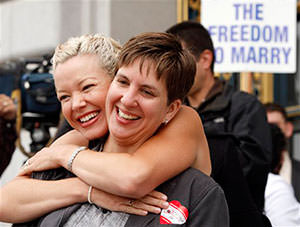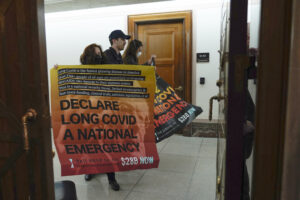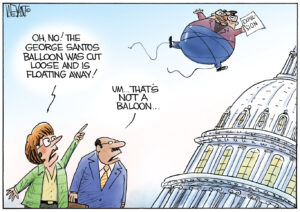Same-Sex Marriage and the Supreme Court’s Historic Choice
At least this much can be said of the Supreme Court under Chief Justice John Roberts: It doesn't duck the hard ones.
At least this much can be said of the Supreme Court under John Roberts now that the high tribunal has agreed to review two cases testing the constitutionality of same-sex marriage: The chief justice and his colleagues don’t duck the hard ones. In agreeing to examine California’s Proposition 8 (Hollingsworth v. Perry) and the federal Defense of Marriage Act (Windsor v. United States), the court has created a defining moment, not only for its own legacy but for the country as a whole. By upholding the right of same-sex couples to marry, the court could lay the foundations of an expansive constitutional framework for the 21st century. By deciding in the other direction, the court could take us decisively backward. History is at stake.
The easiest way to tell that the opponents of same-sex marriage are on the wrong side of history is that their strongest argument is an updated and hypocritical iteration of one the nation rejected a century and a half ago. This is the contention that in democracies, majorities rule and that once a law delineating individual rights is duly ratified — either by way of a ballot initiative, as in California’s Proposition 8 in 2008, or by an act of Congress, as in the 1996 passage of DOMA — it should withstand judicial scrutiny. As Tony Perkins, president of the conservative Family Research Council (which helped write DOMA), exclaimed in a press release issued soon after the Supreme Court’s announcement that it would take on the two marriage cases, “Voters … will not accept an activist court redefining our most fundamental social institution.”
On the eve of the Civil War, the notion that majority rule trumped individual rights was known as “popular sovereignty.” The concept was at the heart of the most famous electoral debates in our history — those between Democrat Stephen Douglas and Republican Abraham Lincoln in the Illinois Senate contest of 1858.
With the union fast unraveling over the question of slavery’s spread into the Western territories and particularly Kansas, Douglas defended the right of each jurisdiction to vote slavery up or down. Lincoln, though not yet a committed abolitionist much less a proponent of true racial equality, countered that popular sovereignty not only undermined the long-term goal of the nation’s founders to set slavery on a course of “ultimate extinction” but that the idea of leaving individual rights to the changing whims of political majorities corroded, rather than advanced, the ideals of self-government.
Writing in a 2009 Daily Dish blog post about the brewing controversy over Proposition 8, political commentator and gay rights activist Andrew Sullivan cited one of Lincoln’s 1855 letters, in which the future president reasoned:
“Our progress in degeneracy appears to be pretty rapid. As a nation, we began by declaring that ‘all men are created equal.’ We now practically read it, ‘all men are created equal, except negroes. … ’ ”
As Sullivan suggested, substitute the word “gay” for “negroes” and Lincoln’s logic still resonates in today’s same-sex marriage disputes.
As recent opinion polls show, support for same-sex marriage across the country is growing, with roughly half of Americans — albeit many of them young and in blue states — favoring equality. Currently, excluding California, nine states plus the District of Columbia recognize same-sex marriage. At the same time, however, 31 states have amended their constitutions to prohibit such unions.
So when all the legal arguments are heard, how will the Supreme Court — considered by many the most conservative in decades, but also one of the most activist — weigh in? Contrary to the complaints raised by some on the right, the court possesses well-established powers of judicial review, authorizing it to uphold or strike down both state and federal laws. From a strictly technical standpoint, the two cases under review thus present the justices with several options, ranging from wholesale constitutional endorsement or rejection of same-sex marriage to the crafting of narrow decisions that restrict the scope and application of each lawsuit. The court could also dismiss either or both cases on procedural grounds.
The DOMA case, brought by 83-year-old Edith Windsor — a New York woman who was required to pay federal estate taxes after her longtime partner whom she had married in Canada died — raises the issue of whether equal protection principles prohibit the federal government from using DOMA to deny gay and lesbian married couples the same treatment as heterosexuals in states that have already approved gay marriage. Had Windsor been wed to a man, she would have paid no inheritance tax. Although it’s difficult to discern how the Roberts court, committed by its own past decisions to states’ rights and federalism, could uphold DOMA as applied to approving states like New York, it’s unlikely the justices will restrict the application of DOMA elsewhere or establish a nationwide constitutional standard in favor of same-sex marriage even if they rule in Windsor’s favor.
The Proposition 8 matter, by contrast, offers a better opportunity for broader gains, although the opportunity is circumscribed both by the Supreme Court’s right-wing orientation and the narrow wording of the lower court decision in the case. In a 2-1 majority opinion written by the 9th Circuit’s Stephen Reinhardt, perhaps the most consistently liberal appellate judge in the country, the court explicitly sidestepped the question of whether same-sex couples have a fundamental federal constitutional right to marry. Rather, in what may have been an attempt to avoid review altogether by the Roberts court, Reinhardt limited his opinion to California, holding only that Proposition 8 had violated the rights of same-sex married couples there by invalidating a ruling of the state Supreme Court and in the process unlawfully singling out gays and lesbians for discriminatory treatment.
As most students of constitutional law well know, the Roberts court has been no fan of the 9th Circuit generally or Reinhardt in particular. Last term alone, the high court reversed no less than 17 9th Circuit rulings, more than three times the number of reversals issued for any other circuit court. Overturning Reinhardt’s decision and upholding Proposition 8’s gay marriage ban would be consistent with that trend.
Doing so, however, would be wrong and not just legally but also for the same profound moral reasons that Lincoln raised in the 1858 debates over popular sovereignty and slavery. When it comes to individual rights and freedoms, principle and human dignity should prevail over politics. Given the positive gay rights record of the court’s perennial swing vote — Justice Anthony Kennedy, whose majority 2003 opinion in Lawrence v. Texas overturned that state’s sodomy law — there is some reason to hope the Supreme Court will go even further than the 9th Circuit and recognize once and forever the basic right of consenting adults across the country to marry the partners of their choice.
We had to fight a civil war to settle the debate over slavery. All that’s needed this time is some fair and forward thinking from the nation’s top judicial body.
Your support matters…Independent journalism is under threat and overshadowed by heavily funded mainstream media.
You can help level the playing field. Become a member.
Your tax-deductible contribution keeps us digging beneath the headlines to give you thought-provoking, investigative reporting and analysis that unearths what's really happening- without compromise.
Give today to support our courageous, independent journalists.






You need to be a supporter to comment.
There are currently no responses to this article.
Be the first to respond.